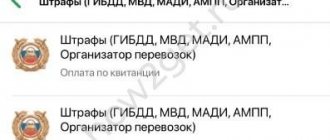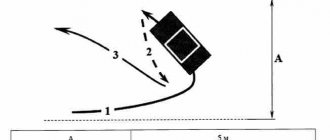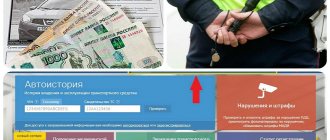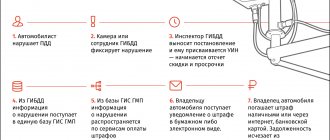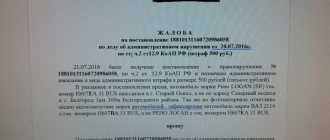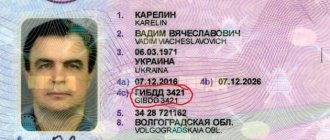Unknowingly or on purpose, almost all drivers violate traffic rules at least once in their lives. Some of them are sincerely surprised at this, not understanding what exactly they violated and why the fine was imposed. But this does not relieve responsibility. Not all motorists are well acquainted with the intricacies of administrative legislation. And even more so, few of them are aware that there is such a rule as the statute of limitations for traffic police fines. Essentially, this is the period after which you will no longer be held accountable. In this publication, we will look in detail at how long fines are stored in the traffic police database, whether it is possible not to pay, and what this entails.
Time frame for paying fines in 2018-2019
According to the norms of Russian legislation, namely, the Code of Administrative Violations, car owners who are subject to certain penalties for violations are required to pay a fine no later than eighty days after receiving it. This period of time is essentially divided into three stages:
- The first ten days, during which the offender can appeal the protocol in court in the event that he partially or completely disagrees with the punishment;
- 60 days from the moment the decision came into force;
- Ten days after the case was transferred from the court to the enforcement authorities.
Please note: for any violations, the countdown begins from the moment a copy of the protocol and a payment receipt were received. This rule is the same for all motorists: those who were issued a fine on the spot, and those who received a corresponding notification by mail as a result of video recording of the violation.
Accordingly, we can summarize: for almost three months there is no rush to pay the fine. But if you wait and exceed the deadline established by law, you will certainly face various sanctions. Among these:
- Double the fine (but not less than 1000 rubles);
- Arrest for fifteen days;
- Executive work for a period of 50 hours;
- Problems with border crossing;
- Refusal to leave the Russian Federation for other countries (this rule applies to fines exceeding 10,000 rubles and only if there is a corresponding court decision)
That is why, before refusing to pay a fine, think about whether it is worth it and what consequences are possible in your case.
What happens before traffic police fines are written off according to the statute of limitations?
Adding to the electronic mobile database of the traffic police. As soon as a violation report is issued against the driver, information about this goes into the traffic police database. To connect to this database and quickly check fines, inspectors on the road have tablet computers.
Transferring the fine to bailiffs. After 70 days from the date of the decision, a traffic police officer or an automated system checks whether the fine has been paid. If not, he will send a copy of the resolution to the FSSP.
The bailiff will issue a resolution on enforcement proceedings and send a copy of the document to the driver. From now on there are still 5 days to pay the fine.
If you don’t pay even then, the bailiff may issue an enforcement fee - 7% of the fine amount, at least 1000 rubles. Now the driver must pay only according to the FSSP resolution - there is no need to pay a traffic police fine. The driver has the same 70 days to pay the new fine. The case will go to court if the offender does not pay this fine.
The court will impose one of the following penalties.
Prohibition on vehicle registration. It will not be possible to deregister or sell the car.
Seizure of accounts. This is the first thing the bailiffs will do based on a court decision. At the request of the FSSP, banks are required to immediately transfer the amount of debt to the account of the federal service. If there is not enough money in the account, it will be withdrawn as soon as it appears there.
Restriction of the debtor's movement. This is possible if the amount of debt is more than 30,000 rubles.
Suspension of driver's license. This is possible if the debt is more than 10,000 rubles. But there are exceptions:
- a disabled person of group I or II or parents of a disabled child travel by car;
- transporting an offender is the only way to make money. An example is working in a taxi or cargo transportation;
- the judge allowed the offender to pay the fine in installments or gave a deferment.
Referral to correctional labor. The judge can impose up to 50 hours of correctional labor.
Possibility of administrative arrest. The law provides for 15 days of arrest for fine defaulters. But there is an exception - the driver cannot be arrested if the decision from the traffic police is drawn up based on a photograph or recording of a traffic camera.
Limitation period for traffic police fines
In fact, every driver is obliged to repay the receipts issued to him on time and in full. Road patrol services must closely monitor compliance with this norm. But this doesn't always happen. Especially when it comes to minor fines. That is why the situation is quite real when such holders of fines are forgotten. In practice, this is like this: 80 days have passed, and the offender has not received any notice by mail. What to do in this case? Hurry to the cashier and quickly pay the fine? In fact, you shouldn't do this. After all, this is exactly the case when you can wait. And it is likely that in this case the statute of limitations will come to an end. A tempting prospect, isn't it?
How long are fines stored in the traffic police database?
The Code of Administrative Offenses of the Russian Federation clearly defines the norms when a fine can be completely forgotten. Given the fact that no relevant changes were made in 2021, the statute of limitations for similar cases is two years from the date of entry into force. However, we should not forget that the traffic police fine does not come into force immediately, but only ten days after receiving it. This period may be longer in cases where judicial appeals take place. Therefore, two years should be counted not from the moment when the receipt was received, but from the period when the decisions came into force. Essentially, it's two years plus ten days.
When will the bailiffs take over your case?
Bailiffs, as a rule, allow a minimum period of time for voluntary repayment of a fine - only five days. It is also worth mentioning that only those drivers who were not looked for at all or looked for poorly, and not those who hid well from the bailiffs, manage to avoid paying fines (by waiting for the statute of limitations to expire).
When chance can help
Sometimes all sorts of delays that are inherent in the work of various government agencies can prevent you from paying fines. In other words, if you received a citation in the mail for a traffic violation that occurred more than two months ago, no one can force you to pay for it. Another option is possible: the violation order, which was recorded by a photo/video camera, was sent, but continues to gather dust in the mail, and the recipient is in no hurry to pick it up. In this case, this letter will be sent again to the sender. And it is from this moment that the corresponding resolution will come into force. In a situation where the fine exceeds the amount of 10,000 rubles, and the violator ignores payment, then a temporary restriction on traveling outside the Russian Federation may well be applied to him.
Important points
There is often a situation where the video camera is not fixed correctly. As a rule, we are talking about situations where the equipment mistakenly photographed the actions of a motorist who did not violate the rules. In these cases, it is definitely worth challenging the decisions of the traffic police in court. In addition, the fact of a violation can be documented only no later than three months. In the case where they require the driver to pay a penalty after ninety days, this is illegal.
How long does it take for traffic police fines to expire?
So, if you don’t pay traffic fines, they will expire—the data is current as of May 29, 2021. This happens 2 years after the date of entry into force of the decision on such a fine. Article 31.9 of the Code of Administrative Offenses tells us this:
Article 31.9. The limitation period for the execution of a decision to impose an administrative penalty.
1. A resolution on the imposition of an administrative penalty is not subject to execution if this resolution has not been enforced within two years from the date of its entry into legal force.
As you can see, everything is simple! Execution of a punishment is the payment of a fine, and if the fine has not been executed within two years from the date it entered into legal force, it expires.
But what is the effective date? According to the same Code of Administrative Offenses (Article 31.1), this is the date on which the period for appealing the decision on a fine expires. That is, first the inspector makes a decision (namely a decision, not a protocol), then there is a period during which this decision can be appealed, and after this period the decision comes into force, and it can no longer be appealed. The appeal period for almost all traffic fines is 10 days. But this period is interrupted if you appeal the decision.
If the decision was made not by the inspector, but by means of automatic recording, then the period for appeal begins after the driver has been properly notified of the punishment. Such notification is a registered letter with a copy of the resolution received by the driver at his place of registration if he did not evade receiving it.
Example: citizen Ivanov committed a violation on June 3, 2021 - he was driving at an excessive speed, which was recorded by a self-driving camera. As a result, a resolution was drawn up against him, issued on June 5 of the same year, and a copy of the resolution was sent to Ivanov by mail. Ivanov received this copy on June 14, 2021, and did not appeal this fine.
As a result, we get the following timing:
- The date of entry into force of the resolution is June 24, 2016 (date of receipt of the copy + 10 days for appeal).
- The expiration date for the fine is June 24, 2018.
It seems like nothing complicated, doesn’t it?! But in reality, fines are burned in this way very rarely. The fact is that the state takes good care of replenishing the budget, so it will not allow you to simply not pay a fine - this will be discussed below.
Is there a statute of limitations for traffic fines?
Taking into account the above, unpaid fines will be automatically canceled after two years and ten days have passed from the moment you received the relevant notices and payment documents. It is possible that you will not have the opportunity to refuse to pay the fine at that time. The reason for this is the peculiarities of the well-known bureaucratic machine.
There will be no grounds for paying a fine in cases where:
- The fine was issued more than 60 days after the violation;
- The decision was made in judicial appeals of the penalty later than 90 days, which had passed from the moment the offense was committed.
Deadlines for paying traffic fines
The violator has 70 days to pay the fine. Of these, the first 10 are for appeal and another 60 are for payment. In addition, in the first 20 days from the date of the decision, the fine can be paid with a 50% discount.
Appeal period. The driver has 10 days to do this from the date of drawing up the protocol.
Discount payment. Within 20 days from the date of the decision, you can pay the fine with a 50% discount.
Let's see how it works on “Traffic Police Fines”. To check, you will need the car's license plate number, registration certificate and license number. If 20 days have not yet passed, there will be a discount reminder next to the information about the fine.
The discount on this fine will disappear if you do not meet the deadline. Date of ruling at top left
Payment in full. Already 21 days from the date of the decision, the 50% discount will disappear. There are still 40 days left for payment, during which the fine will have to be paid in full.
When this period ends, the case from the traffic police will be transferred to the bailiffs for collection.
conclusions
Almost all decisions have their own statute of limitations. A fine from the traffic police is no exception. However, consider whether you should wait a little over two years for the penalty obligation to disappear. Especially if you have to constantly risk meeting with bailiffs or worry about being denied permission to travel abroad. And this takes into account the fact that many fines are cheap. Of course, this is a rather controversial issue. At the same time, each car enthusiast decides it exclusively for himself personally.
But most importantly, the best way to avoid paying fines is to drive strictly according to the traffic rules. This is the only way to save nerves, time and, most importantly, your financial resources, spending them on more pleasant and useful things.
Remember
- The statute of limitations for traffic police fines is 2 years from the moment the resolution came into force. After this, it will no longer be possible to punish the driver.
- The fine must be paid within the first 70 days from the date of the decision.
- Before a fine is written off, information about it will be transferred from the traffic police to the FSSP. Bailiffs have the right to assign an enforcement fee. If you don’t pay even then, by court decision the bailiffs have the right to withdraw money from the account, restrict travel abroad, revoke your license, or even arrest you.
- The judge may increase the statute of limitations if the debtor evades payment or asks the court for a deferment or installment plan.
- You can check the fine on the Traffic Police Fines website.
All articles by the author: Evgeniy Lesnov



